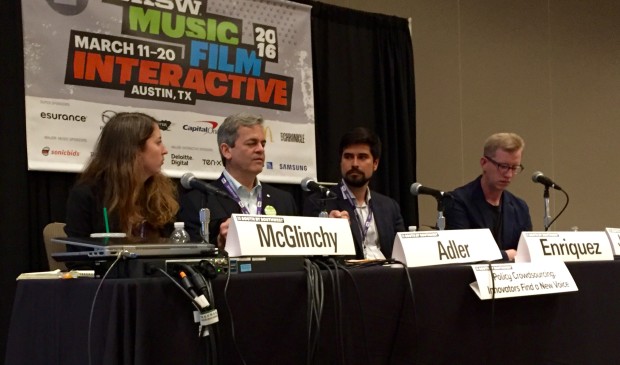At SXSW, Adler discusses public engagement
Monday, March 14, 2016 by
Caleb Pritchard Mayor Steve Adler took advantage of South by Southwest on Saturday to spotlight opportunities to enhance public engagement through partnerships with tech sector entrepreneurs.
The mayor was one of three speakers on a panel called “Crowdsourcing Policy: Constituents to Changemakers” and hosted by KUT reporter and Austin Monitor contributor Audrey McGlinchy.
Appearing with Adler were Francisco Enriquez, co-founder of Austin-based “crowdsourcing think tank” Glasshouse Policy, and Josh Jones-Dilworth, CEO of consulting firm Jones-Dilworth Inc.
Adler and Jones-Dilworth had previously worked together on the Thumbs Up! Program, an attempted compromise in the ongoing regulatory battle between City Council and transportation network companies Uber and Lyft. Among the sticking points in that contretemps is whether to enforce fingerprint-based background checks on TNC drivers.
Adler explained that the Thumbs Up! partnership is proof that Austin’s government is more open to innovation than those private firms.
“They don’t have to innovate,” Adler said, “because the overwhelming number of cities accede to their request not to mandate fingerprinting in order to be able to preserve the services. So they don’t have to innovate. Most cities roll.”
Jones-Dilworth said that there is a chasm between the public and private sector in the modern economy because entrepreneurs are generally taught a doctrine of disruption that encourages them to “replace existing systems wholesale.” He said the onus is on private firms to get savvy about the more or less permanent nature of government.
“I think there’s a coming-to-terms on both sides of the table that has been sort of cataclysmic and I think will continue to be for the next 18 months,” said Jones-Dilworth. “But I’m ultimately optimistic that we’re going to get there.”
McGlinchy pointed out that there is another partner sitting at that proverbial table: the public. She questioned the panelists about the best ways to use technology to engage constituents in a democratic society.
“We live in the 21st century,” Enriquez responded. “The barriers to communication are virtually nil.” He stressed that government outreach must aggressively seek out input from residents rather than rely on limited engagement during physical meetings.
Enriquez’s Glasshouse Policy has stepped in to help bridge the divide between Austin’s government and its residents through the MobilityATX program. According to Glasshouse’s website, that project is aimed at finding “citizen-sourced solutions to a variety of mobility verticals, from commuting to impaired driving.”
In October, MobilityATX released a report suggesting that the most popular transportation option among Austinites is the nine-figure Bicycle Master Plan.
McGlinchy asked how the ideas in that report could be transformed into actual policy.
“Where crowdsourcing really has its strength is in providing a roadmap – not a mandate, not a referendum – for policy workers to move forward with their work in a more reasonable way,” Enriquez said.
Adler indicated that that kind of input is crucial to the grinding work of democratic leadership. He said that heretofore the city has budgeted for other priorities the money that could be spent on the Bicycle Master Plan. He explained that it will require hard work to convince voters that changing those priorities is a credible idea.
“It should be hard to get 120 (expletive) million dollars,” quipped Jones-Dilworth. “It’s supposed to be hard to get that money. The serious people will pursue it seriously.”
In the end, the mayor stressed that finding new ways to proactively engage stakeholders will serve to mute the din of squeaky wheels. By way of illustration, he explained that the alternative – relying on residents to reach out to him – rarely results in messages of moderation.
“I don’t get any of those,” said Adler to a roomful of chuckles. “People are doing it because they are vociferously, positively, absolutely sure that their extreme position is the right answer.”
After the panel wrapped up, the Austin Monitor asked Adler about recent attempts by a local agency at public engagement. Specifically, the Monitor wanted to know how Adler proposed to rebuild trust in the public engagement process after doubts were raised regarding the credibility of Project Connect’s efforts to cook up an urban rail proposal in 2013.
“I heard the same thing about that process,” Adler said. “I think you answer that in part by asking open-ended questions and being truly receptive to what it is that you hear.”
You're a community leader
And we’re honored you look to us for serious, in-depth news. You know a strong community needs local and dedicated watchdog reporting. We’re here for you and that won’t change. Now will you take the powerful next step and support our nonprofit news organization?









